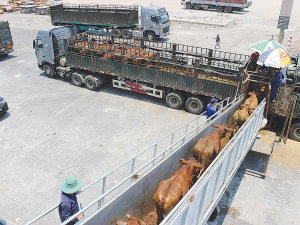Farmers back ‘gold standard’ regulations for livestock exports
Federated Farmers want to see the return of cattle exports but insists that animal welfare and New Zealand’s international reputation must be protected first.
 Live Animal Export New Zealand says claims banning live exports is out of step with the views of the New Zealand public.
Live Animal Export New Zealand says claims banning live exports is out of step with the views of the New Zealand public.
The organisation that represents live exporters believes a more highly regulated industry would have been a better approach than a complete ban.
Live Animal Export New Zealand (LENZ) says banning live animal exports will damage the New Zealand economy and claims the move is out of step with the views of the New Zealand public, according to research it has carried out.
"According to an independent research report by science insights company Voconiq, over half of New Zealanders surveyed have confidence that regulation can hold the industry accountable," LENZ spokesman Mark Willis says.
He adds that the industry's call for a Gold Standard of care for live animal exports in NZ has been ignored by the Government.
"Two years ago, our industry banded together to propose that the Government introduce much higher standards of care for the animals exported from New Zealand. We set out a clear and evidence-based 12-point regulatory plan to Minister O'Connor that would further improve and modernise the live animal export system," Willis says. "We did not receive any response."
LENZ accuses the Government of failing to consult in good faith with industry. "The end result will be legislation that is detrimental to the livelihood of farmers and New Zealand's economy, and a missed opportunity to lift the standards of live animal exports globally."
Two Waikato dairy farmers and Federated Farmers leaders have thrown their hats in the ring for this year's Waikato Regional Council elections.
Buying a farm is challenging but still achievable according to research recently carried out by Smaller Milk and Supply Herds (SMASH).
A world-first public-private joint venture helping farmers cut emissions is set to have the first product from its investment portfolio - a methane-reducing bolus - available for beef farmers early next year.
Donald Trump's uncompromising tariff policy is set to put New Zealand dairy exports to the US under huge pressure.
Two large milk processing plants in New Zealand are changing hands.
Sheep and beef farmers are urging the Government to do more to stop productive farmland overrun by pine trees.